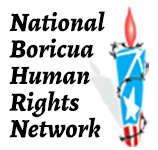Michael E. Deutsch
People’s Law Office-Chicago
April 2008
The celebrations marking the 100th anniversary of the birth of Puerto Rican National poet and revolutionary independentista, Juan Antonio Corretjer, roused my memories of this great man. I was privileged to have met and spent time with Don Juan in the 1970’s and early 80’s as a result of my work as an attorney on behalf of the Puerto Rican Nationalist Prisoners. I had been introduced to Corretjer on several occasions, but I did not come to know him until I had the extraordinary opportunity to accompany him to Leavenworth Federal Prison and arrange his access as my para-legal to visit Nationalist Prisoners, Irvin Flores and Oscar Collazo.
In the course of our travel to and from the prison, Don Juan related to me the history of the Nationalist Party, Albizu Campos and the trials and repression in the 1930’s. Here was a man who was at the center of the storm, the secretary general of the Nationalist Party, sharing those experiences as we traveled along the great Midwest Plains of the United States. I was mesmerized by his words and felt great fortune to be there listening to him.
Gaining access to the prison with Don Juan as my para-legal was by no means a sure thing. However, things went smoothly, and we entered the visiting room to wait for the appearance of Oscar and Irvin. We they arrived and saw Correjer sitting there their faces first showed great surprise followed quickly by the utter joy of seeing a dear comrade that they were not expecting. I felt that I was an eye-witness to history, the first meeting of these Puerto Rican revolutionaries after over 30 years. They reminisced about old friends, the state of the independence movement and the international campaign for the freedom of the 5 Nationalist prisoners. All the while I sat in great awe of these courageous men who had sacrificed so much for the freedom of their country, and despite the hardships along the way, had maintained their strength and dignity. I was also deeply moved by the gentleness and deep respect they showed to one another as they interacted.
As we left Kansas, and I bid goodbye to Don Juan, he thanked me for facilitating the visit and again I was struck by his gentleness and warmth. It was not long after that I had a chance again to meet with Don Juan and he had an unexpected opportunity to return my favor. I had traveled to Puerto Rico for some meetings on the Free the Nationalist campaign and the campaign to oppose the attacks by the federal grand jury on the independence movement.
I was invited to the home of Don Juan and his wife Consuelo Lee, a great revolutionary in her own right. They showed me around their humble casita in Guyanabo, filled with his books and art work of Puerto Rico and the independence movement, and we sat in his small patio to discuss the political campaigns. He told me about the work of the independence lawyer Fermin Arriza and his effort to raise the issue of the right of imprisoned Puerto Rican independence fighters to prisoner of war status, as he explained Puerto Rico was a country intervened by U.S. imperialism and at war since 1898. It was this discussion that provided the basis for our legal team’s juridical support for the Prisoner of War claim of William Morales and the other FALN prisoners captured later in April of 1980.
In the midst of this conversation Don Juan suggested that we go visit Pedro Saade, an independence lawyer that was imprisoned for refusing to testify before a federal grand jury and was being held nearby in the Princesa prison. Don Juan expected that he could again gain access to the prison as my para-legal. As we entered the outer prison we were met by the officer in charge who examined my U.S lawyer credentials with great skepticism. He looked at my lawyer’s card and looked at me slowly shaking his head. He then looked at Don Juan and again at the card and simply said, “for a gentlemen from Puerto Rico, I will let you enter.” It was the Officer’s respect and admiration for Don Juan that gained us entry to visit Pedro Saade that day, not my lawyer’s credentials.
Several years later, I picked up the phone at home to hear Don Juan’s voice on the other end. He was calling me to tell me about the sentencing hearing held in the Federal Court in Brooklyn for Carlos Noya and Federico Cintrón, for refusing to testify before a grand jury. Many of the leading figures of the independence movement had testified in their behalf, including Nieves Falcón, Rubén Berríos, and Attorney Luis Camacho. It was an important hearing in the U.S., and I very much had wanted to be there but was unable to go. Don Juan was calling to tell me about the court hearing, knowing that I had wanted to be there. After going through the testimony he remarked that I had been missed at the hearing and that I had been in his thoughts. That this giant of the independence movement, a man well into his 70’s had taken the time to reach out to me and to tell me that he had missed me at the hearing was to say the least quite moving. It really underscored that human quality of this remarkable man. I will never forget this revolutionary of great dignity and kindness.


